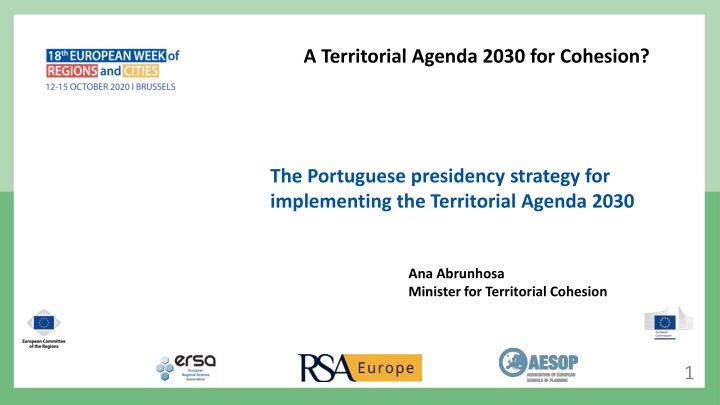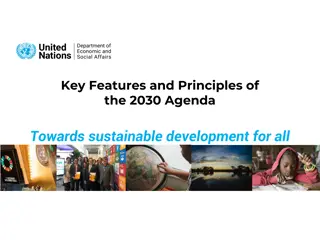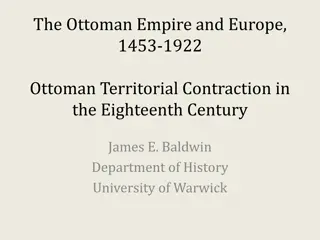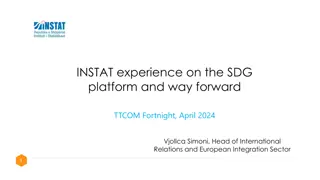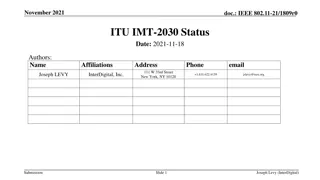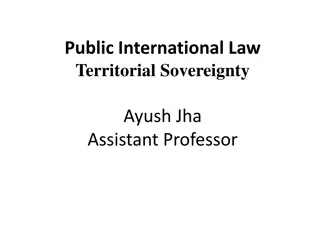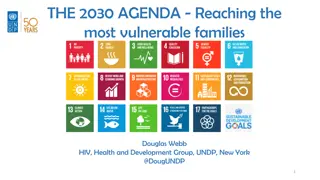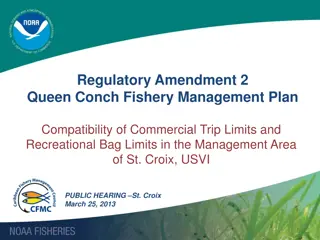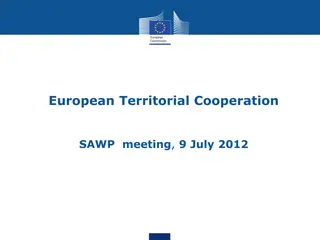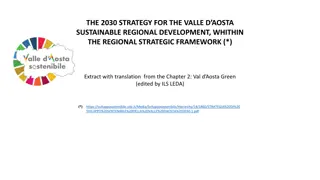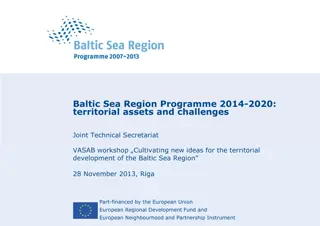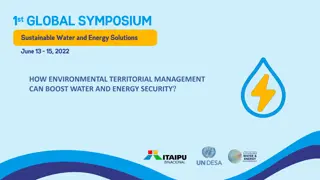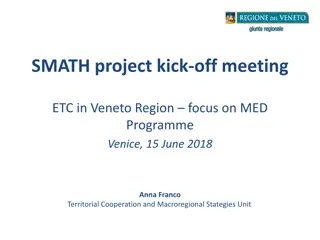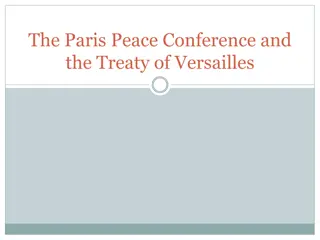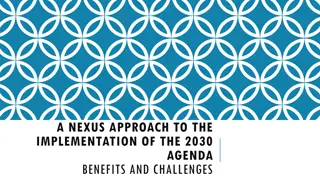implementing the Territorial Agenda 2030
The Portuguese Ministry for Territorial Cohesion is implementing a strategy for the Territorial Agenda 2030, focusing on improving responses to territorial challenges such as social, competitiveness, and sustainability issues. The vision is to promote balanced development by reducing regional asymmetries and enhancing cohesion and competitiveness in territories. The importance of the Territorial Agenda 2030 in guiding political interventions for cohesion and promoting action-oriented frameworks is highlighted.
Download Presentation

Please find below an Image/Link to download the presentation.
The content on the website is provided AS IS for your information and personal use only. It may not be sold, licensed, or shared on other websites without obtaining consent from the author.If you encounter any issues during the download, it is possible that the publisher has removed the file from their server.
You are allowed to download the files provided on this website for personal or commercial use, subject to the condition that they are used lawfully. All files are the property of their respective owners.
The content on the website is provided AS IS for your information and personal use only. It may not be sold, licensed, or shared on other websites without obtaining consent from the author.
E N D
Presentation Transcript
A Territorial Agenda 2030 for Cohesion? The Portuguese presidency strategy for implementing the Territorial Agenda 2030 Ana Abrunhosa Minister for Territorial Cohesion 1
- The role of the Portuguese Ministry for Territorial Cohesion - The importance of Territorial Agenda 2030 for the Cohesion - Pilot Action for the Territorial Agenda 2030 2
The role of the Portuguese Ministry for Territorial Cohesion The Portuguese Government will reinforce the implementation of public policies in the territory to increase the effectiveness and the response to current and future challenges. So, the existence of this new Area of Government brings a new way to do people and place-based policy, supported on territorial interventions and mobilized for integrated and tailor-made action. We must make it happen, knowing where we want to go and how, when, and who to mobilize to be with us. Let's not leave any person or territory behind!! 3
The role of the Portuguese Ministry for Territorial Cohesion The Ministry for Territorial Cohesion approved a Strategy for Territorial Cohesion that will improve our capacity to implement responses to territorial challenges: - Social challenges that have different expressions in the territory and constitute bottlenecks to intra and inter-regional cohesion when we design and implement public policies. - Challenges to competitiveness that require specific measures to attract and mobilize investment and qualified people to our more fragile regions. - Sustainability Challenges through a more focused approach to bring economic and social value to endogenous resources and value chains, leveraged in reducing the carbon footprint and promoting circularity. A balanced development of the territories will have a greater impact if we reduce regional asymmetries,promote cohesion, reinforce the territories' competitiveness and give more coherence to regional and sectoral policies. The vision of our Strategy for Territorial Cohesion The vision of our Strategy for Territorial Cohesion 4
The importance of Territorial Agenda 2030 for Cohesion The role and goals of Territorial Agenda 2030 should be a guideline for the political intervention on the Cohesion process. We make a real statement by choosing A Future for all places as the brand for our plan. The Territorial Agenda provides an action-oriented framework to promote territorial cohesion in Europe, a multilevel process to engage countries, regional and local authorities at transnational, macro- regional, and cross-border levels. Everyone is welcome to use the Territorial Agenda. Treat different what is different, valuing differences, and ensuring a real connection between resources and the decision-making process. 5
The importance of Territorial Agenda 2030 for Cohesion The Agenda, based on horizontal and vertical coordination, policymaking, and integrated territorial development, contributes to territorial cohesion. It addresses different levels of governance (with a multilevel governance approach), contributing to subsidiarity. It ensures cooperation and coordination involving citizens, civil society, business, research and scientific institutions and knowledge centres. The quality of the government and the governance process is an essential cross-cutting principle for local, regional, national, and European development. It matters for society's well-being and is a pre- requisite for long-term sustainable increases in living standards, investments, social trust, and political legitimacy. 6
Pilot Action for the Territorial Agenda 2030 By preparing the presidency process for the first half of 2021, Portugal is a very active partner at the work of Territorial Agenda 2030, represented by the Environment Minister. In the framework of the Agenda and the National Spatial Planning Policy Programme, Portugal proposes a Pilot Action, focused on Climate change adaptation and resilience through landscape transition, lead by the Portuguese Ministry for Environment and Climate Action. The pilot action focuses on integrated climate change adaptation (environmental, social, and economic resilience) by planning and designing new landscape measures to decrease forest fires in Portugal. It implies funding ecosystem services, promoting sustainable value chains and developing innovative governance approaches for the planning and relevant policies. The link between the Pilot Action and the Territorial Agenda 2030 underlines the importance of well functioning and resilient ecosystems to mitigate the impact of climate change under the goal of a Green Europe. 7
Pilot Action for the Territorial Agenda 2030 Planned Activities Activities conducted for this Pilot Action will refer to the role of spatial planning for landscape transformation, specifically considering the resilience of the rural areas. These activities will stimulate the interaction between spatial planning and other relevant sector policies, e.g., agriculture and forestry, through an integrated and holistic landscape perspective. It includes the allocation of pertinent public sector funding policies to more effectively strengthen resilience. The implementation phase starting in 2021 Indicative partners from Portugal: players from different administrative and sectorial policies, regional and local stakeholders and universities. Partners from other countries are welcome to join the Pilot Action, i.a., Spain, Greece, Croatia and Germany (tbc). 8
